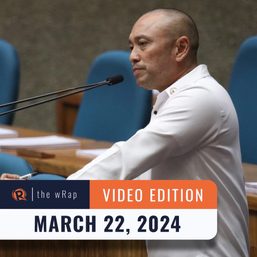SUMMARY
This is AI generated summarization, which may have errors. For context, always refer to the full article.
![[Vantage Point] Budget cuts threaten SPUG power supply](https://www.rappler.com/tachyon/2022/10/vantage-point-october-25-2022.jpg)
High school economics taught us the basic principles of macro and microeconomics: supply and demand, diminishing returns, costs, scarcity, and, of course, inflation. While it would take a seasoned economist to drill each principle down into the minutest detail, you don’t have to be a college graduate to know that a hike in fuel prices also means that increases in the prices of nearly all goods and services follow suit.
It also doesn’t take a college degree to feel the impact of inflation. Average consumers bemoan about high prices of goods and services, especially of basic commodities (food, utilities, transportation, etc). At the risk of sounding like an alarmist, I will reiterate what I said in a previous piece: majority of us are finding it more difficult every day to draw from our shallow pockets just to make ends meet.
Unfortunately, it seems that things are far from getting better, no matter what your Magic 8 Ball may tell you. Recently, the National Power Corporation (NPC) warned that “missionary areas” in the provinces of Palawan, Masbate, Marinduque, Catanduanes, and Oriental and Occidental Mindoro are in danger of losing access to electricity due to budget cuts by the Department of Budget Management (DBM).
According to data from the NPC, almost 890,000 households are under missionary electrification. As mandated by Republic Act 9136, NPC uses the so-called Small Power Utilities Group to provide power generation and its associated power delivery systems in areas that are not connected to the transmission system. Responsibility for this function was given to 238 highly localized power plants and barges that are partly subsidized by the government. Currently, much like the rest of the country, these SPUG power plants or generation companies (gencos) are already struggling to make ends meet because of rising fuel prices.
Since January of this year, diesel prices have nearly doubled from P38 per liter to around P78 per liter. As most of these SPUG plants are diesel-powered, one can only imagine what kind of toll that would take on them, quite literally, to keep the lights on.
At its recent budget deliberations, the NPC asked for almost P45 billion for the 2023 fiscal year. However, the DBM slashed the proposed amount by 30%, bringing it down to only P32 billion. NPC Department Manager for Financial Planning and Budget Jenalyn Aurea S. Tinonas commented that the amount cannot cover the full-year operation requirements intended, not only for SPUG plants and barges, but also for its New Power Providers and Qualified Third Party (NPP-QTP) subsidy requirements.
The DBM, however, refuted that there was “a reduction in the Corporate Operating Budget (COB) of the National Power Corporation (NPC) under the proposed National Expenditure Program (NEP) for Fiscal Year 2023.”
In its statement, the DBM pointed out that it “has approved the release of a Special Allotment Release Order (SARO) and corresponding cash requirements amounting to P2.9B to cover the subsidy to the NPC’s New Power Providers (NPP)/Qualified Third Party (QTP) for the implementation of the Missionary Electrification Program.” The DBM added that it has issued P1.02B for the fuel requirements for SPUG power plants and barges.
This appears to be a high-level case of “he-said-she-said,” which the ordinary citizen may find both confusing and unacceptable. Technically, what the government spends is taxpayers’ money, and the people are therefore entitled to know how their money is spent. However, this doesn’t change the fact that the SPUG gencos are the ones feeling the heat. According to a report, the Sultan Kudarat Electric Cooperative, Incorporated (SUKELCO), part of the SPUG, was forced to bypass the NPC and buy 120,000 liters of diesel fuel directly from Petron on credit. They had no choice because waiting to get their subsidy from the NPC would mean cutting power to over 50 barangays in Maguindanao.
Another report revealed that Petron also had to limit their fuel deliveries to the Torrijos Diesel Power Plant and Power Barge 120 in Marinduque because the NPC’s committed payments have not been settled. This has forced the plant to reduce their energy production load to stretch out their remaining diesel supply.
Notwithstanding the finger-pointing between NPC and DBM, it cannot be denied that something is broken in the cashflow chain. Since the SPUG gencos are the last link on that chain, they are the ones left flapping in the wind to bear the brunt of the damage.
To belabor the analogy even further, millions of Filipinos are holding onto that broken chain for dear life. It is hard enough for these missionary areas to overcome their countless economic challenges. Just imagine how they will be able to do that in the dark!
We hope that the Energy Regulatory Commission (ERC), NPC, DBM, Petron, and all other diesel suppliers can sort out this mess. In the immortal words of Rod Tidwell from the movie Jerry Maguire, “Show me the money!” It will ultimately be what gives the SPUG the purchasing power that it needs to keep the lights on in the houses they serve. – Rappler.com
Val A. Villanueva is a veteran business journalist. He was a former business editor of the Philippine Star and the Gokongwei-owned Manila Times. For comments, suggestions email him at mvala.v@gmail.com.
1 comment
How does this make you feel?







![[In This Economy] Can the PH become an upper-middle income country within this lifetime?](https://www.rappler.com/tachyon/2024/04/tl-ph-upper-income-country-04052024.jpg?resize=257%2C257&crop=295px%2C0px%2C720px%2C720px)


After “Show me the money!”, this should follow: “Show me the President!” Or should the process be reversed? “Show me the President!” first, then “Show me the money!”?